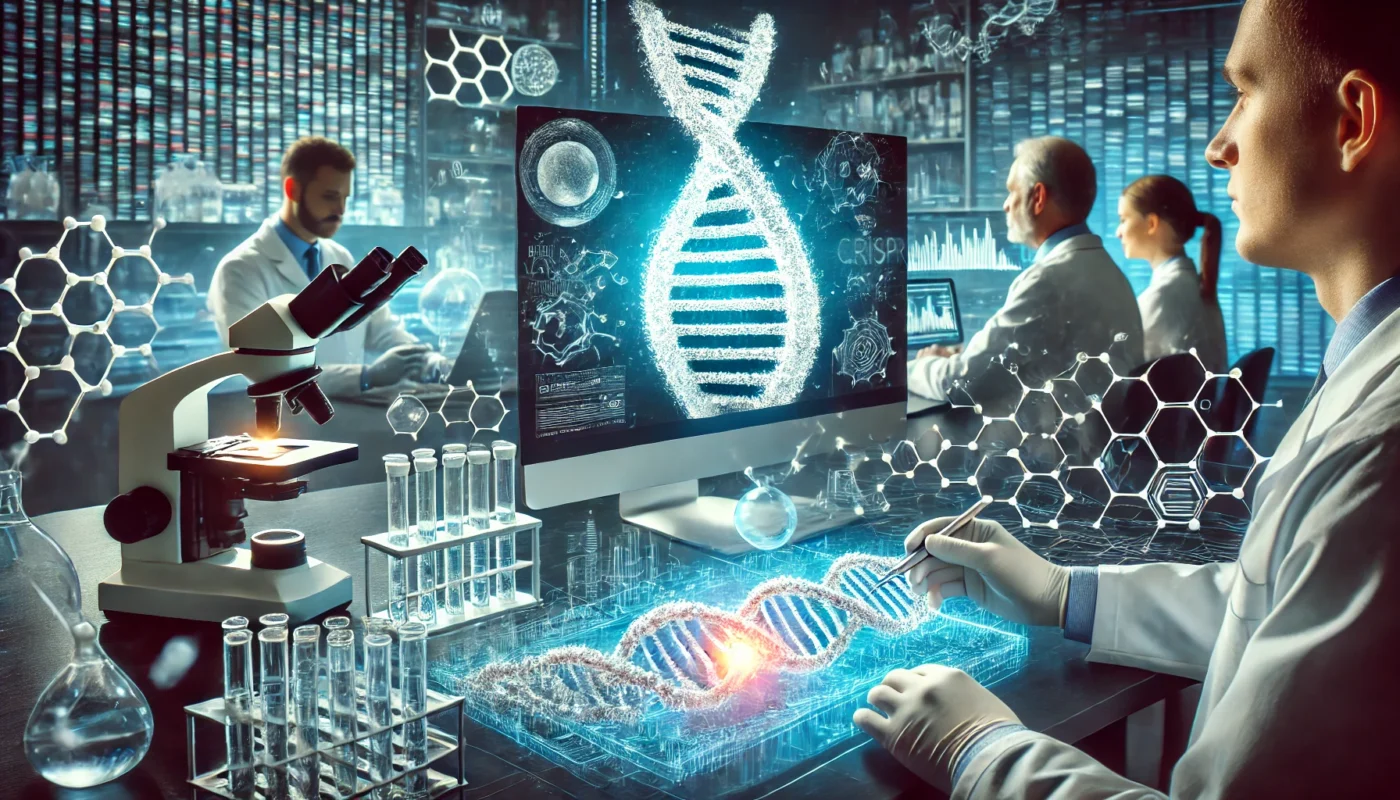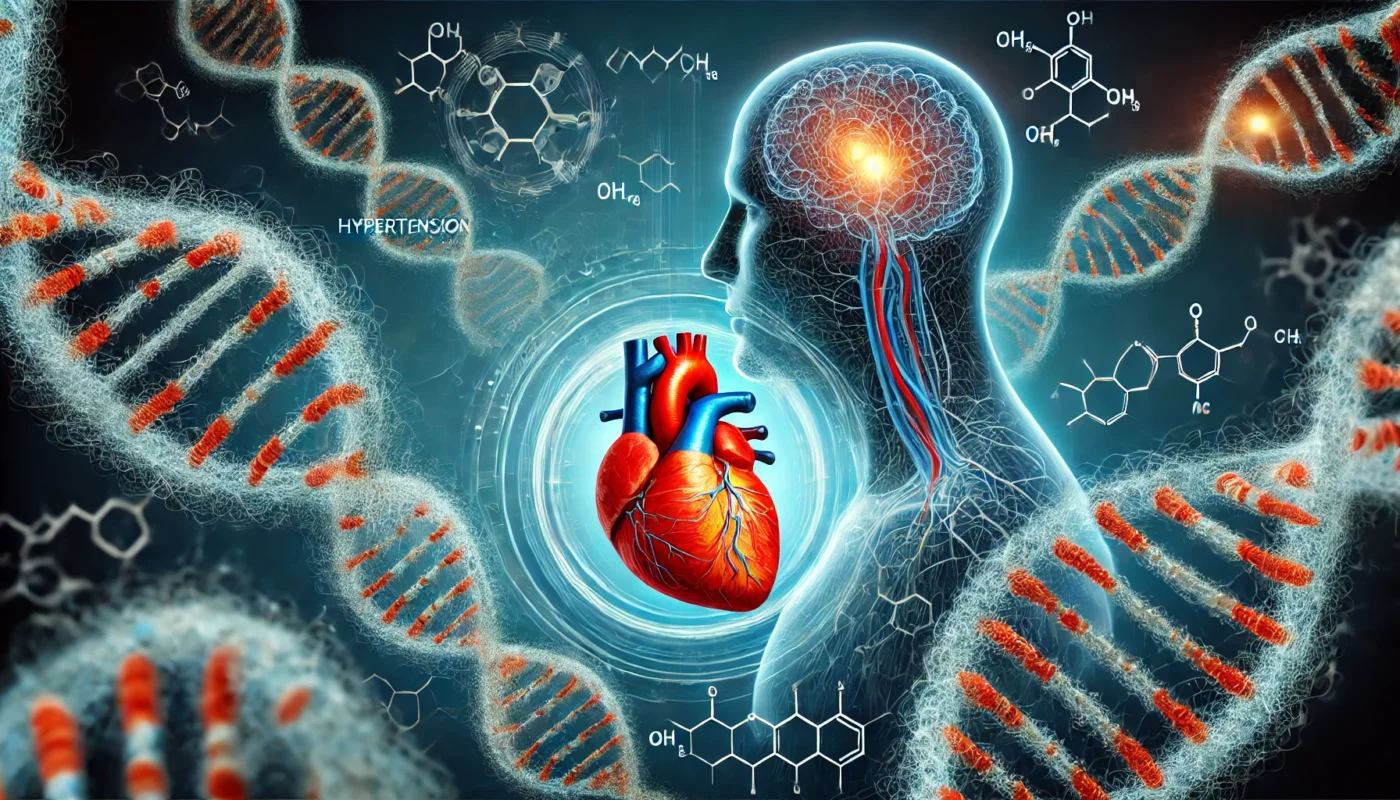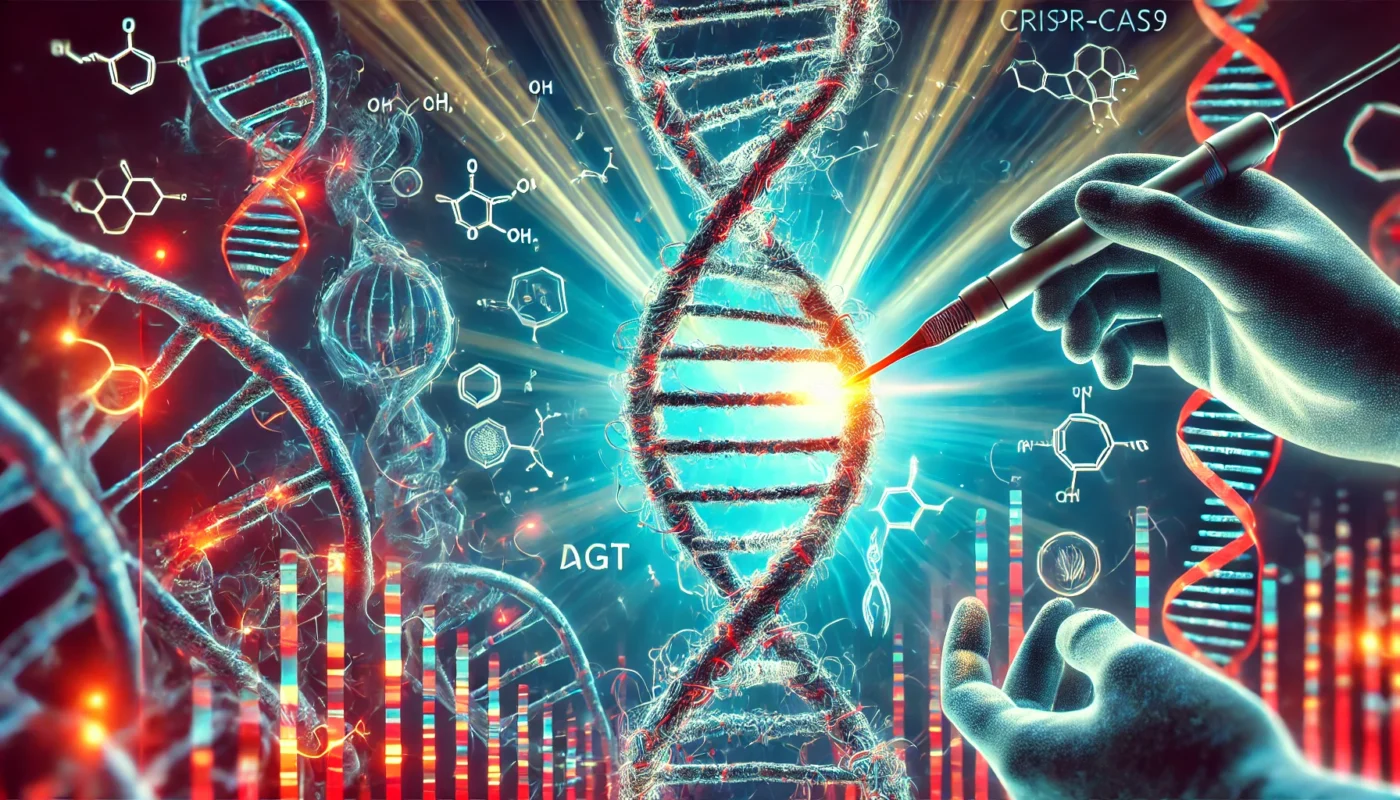Hypertension, commonly known as high blood pressure, affects over 1.28 billion people worldwide, making it one of the most prevalent chronic health conditions. Despite advancements in medications and lifestyle interventions, many patients struggle to achieve optimal blood pressure control, particularly those with resistant hypertension. As researchers explore innovative approaches to managing this condition, gene therapy has emerged as a promising frontier. By targeting the genetic mechanisms underlying hypertension, gene-based therapies offer the potential for more precise and long-lasting treatment. This article examines the science behind gene therapy for hypertension, the experimental therapies under development, and the potential challenges and future prospects of this cutting-edge approach.
You May Also Like: The Role of Precision Medicine in Hypertension Management
Understanding Gene Therapy and Its Application in Hypertension
What Is Gene Therapy?
Gene therapy involves modifying or manipulating genes within an individual’s cells to treat or prevent disease. Techniques include:
- Gene Replacement Therapy: Introducing a healthy copy of a defective gene.
- Gene Silencing: Using RNA interference (RNAi) to suppress the expression of specific genes.
- Gene Editing: Employing tools like CRISPR-Cas9 to precisely edit the DNA sequence of a gene.
Gene therapy has shown success in treating genetic disorders such as cystic fibrosis and sickle cell anemia. Its application to hypertension focuses on targeting the genetic and molecular pathways that regulate blood pressure.
The Genetic Basis of Hypertension
Hypertension is a multifactorial condition influenced by both genetic and environmental factors. Studies estimate that genetic factors account for 30–50% of blood pressure variability in individuals. Key genetic contributors include:
- Renin-Angiotensin-Aldosterone System (RAAS): Genes involved in this hormonal pathway, such as ACE(angiotensin-converting enzyme), regulate blood vessel constriction and fluid balance. Dysregulation of RAAS is a major driver of hypertension.
- Ion Transport Genes: Mutations in genes affecting sodium and potassium balance, such as SCNN1B and WNK1, can lead to increased blood volume and elevated blood pressure.
- Vascular Remodeling Genes: Genes involved in blood vessel structure and function, such as NOS3 (nitric oxide synthase), play a critical role in vascular relaxation and blood pressure control.
Understanding these genetic pathways provides the foundation for developing gene-based therapies to treat hypertension.

Experimental Gene-Based Therapies for Hypertension
Several experimental therapies are in development, targeting the molecular and genetic underpinnings of hypertension. Below are the most promising approaches:
1. Targeting the RAAS Pathway
The RAAS pathway is a primary target for gene therapy due to its central role in blood pressure regulation. Experimental strategies include:
- Angiotensinogen Silencing:
Angiotensinogen is a precursor to angiotensin II, a hormone that constricts blood vessels. Gene silencing techniques using RNA interference (RNAi) aim to reduce angiotensinogen production.- Evidence: A preclinical study published in Hypertension Research (2019) demonstrated that silencing angiotensinogen genes in hypertensive rats significantly reduced blood pressure for several months.
- ACE2 Overexpression:
ACE2 is an enzyme that counteracts the effects of angiotensin II. Gene therapy to increase ACE2 expression has shown potential in restoring balance to the RAAS pathway.- Evidence: Research in Circulation Research (2021) found that delivering ACE2 genes via viral vectors improved blood pressure control and vascular health in animal models.
2. CRISPR-Cas9 Gene Editing
CRISPR-Cas9 is a revolutionary gene-editing tool that allows precise modifications to the DNA sequence. It has been applied to hypertension by targeting genes involved in blood pressure regulation:
- Editing the SCNN1B Gene:
Mutations in SCNN1B lead to excessive sodium reabsorption in the kidneys, contributing to hypertension. CRISPR-Cas9 has been used to correct these mutations in experimental models.- Evidence: A study in Nature Biotechnology (2020) demonstrated that CRISPR editing of SCNN1B reduced blood pressure in hypertensive mice.
- Targeting the AGT Gene:
The AGT gene encodes angiotensinogen, and editing this gene has shown promise in lowering blood pressure.- Evidence: Early-stage research suggests that AGT editing may provide a permanent reduction in RAAS activity.
3. Gene Therapy for Vascular Health
Vascular dysfunction, characterized by impaired nitric oxide production and increased arterial stiffness, is a hallmark of hypertension. Gene therapies aim to restore vascular health by:
- Increasing Nitric Oxide Synthase (NOS) Activity:
The NOS3 gene encodes endothelial nitric oxide synthase, which promotes blood vessel relaxation. Gene therapy to enhance NOS3 expression can improve endothelial function.- Evidence: A study in Cardiovascular Research (2018) found that increasing NOS3 expression in hypertensive rats reduced arterial stiffness and lowered blood pressure.
- Reducing Vascular Inflammation:
Targeting pro-inflammatory genes, such as those encoding cytokines, may reduce vascular inflammation and improve blood pressure control.

Potential Benefits of Gene Therapy for Hypertension
Gene therapy offers several advantages over conventional hypertension treatments:
- Precision Medicine:
Gene therapy targets the underlying genetic causes of hypertension, providing a more tailored approach compared to one-size-fits-all pharmacological treatments. - Long-Term Effects:
Unlike daily medications, which require lifelong adherence, gene therapy has the potential for long-lasting or even permanent effects, reducing the burden of treatment. - Reduced Side Effects:
By focusing on specific molecular pathways, gene therapy may minimize the systemic side effects associated with traditional antihypertensive drugs.
Challenges and Risks of Gene Therapy for Hypertension
Despite its promise, gene therapy for hypertension faces several challenges:
- Safety Concerns:
Off-target effects, such as unintended gene modifications, pose significant risks. These could lead to unforeseen complications, including cancer or immune reactions. - Delivery Methods:
Effective delivery of therapeutic genes to target tissues, such as the liver or vascular endothelium, remains a technical hurdle. Viral vectors, while effective, carry the risk of immune responses. - Cost and Accessibility:
Gene therapy is currently expensive, limiting its accessibility to the general population. Scaling up production and reducing costs will be essential for widespread adoption. - Ethical Considerations:
Editing the human genome raises ethical questions about the long-term consequences and potential misuse of the technology.
Future Directions and Prospects
As research progresses, gene therapy could revolutionize hypertension treatment. Key areas for future exploration include:
- Combination Therapies:
Combining gene therapy with traditional medications or lifestyle interventions may enhance effectiveness and address multiple pathways contributing to hypertension. - Personalized Approaches:
Advances in genomics could enable personalized gene therapies based on an individual’s genetic profile, optimizing outcomes. - Non-Viral Delivery Methods:
Developing non-viral delivery systems, such as lipid nanoparticles, may improve safety and reduce the risk of immune reactions. - Expanded Clinical Trials:
While preclinical studies show promise, large-scale clinical trials are needed to establish the safety and efficacy of gene therapy for hypertension in humans.

Nutritional Support for Hypertension Management
While gene therapy holds promise for the future, nutritional strategies remain a cornerstone of current hypertension management. Below are five evidence-based supplements that support blood pressure control:
- Hibiscus Extract:
Hibiscus promotes nitric oxide production, improving vascular health. The Journal of Nutrition (2010) found that hibiscus tea reduced systolic blood pressure by 6 mmHg. - Magnesium Glycinate:
Magnesium relaxes blood vessels and reduces vascular resistance. A study in Magnesium Research (2016) reported a 5 mmHg reduction in systolic blood pressure with supplementation. - Omega-3 Fatty Acids:
Omega-3s reduce inflammation and improve arterial flexibility. A meta-analysis in Hypertension (2018) found that omega-3 supplementation reduced systolic blood pressure by 4 mmHg. - Coenzyme Q10 (CoQ10):
CoQ10 supports mitochondrial function and reduces oxidative stress. A clinical trial in Hypertension Research(2007) demonstrated an 11 mmHg reduction in systolic blood pressure with supplementation. - Beetroot Powder:
Rich in nitrates, beetroot powder enhances nitric oxide production, leading to improved blood flow and lower blood pressure.

Conclusion
Gene therapy represents a paradigm shift in the treatment of hypertension, offering the potential to target its genetic and molecular causes with unprecedented precision. While challenges related to safety, cost, and delivery remain, ongoing advancements in technology and research are paving the way for its eventual integration into clinical practice. For now, gene therapy remains experimental, but its promise as a transformative approach to hypertension management underscores the importance of continued innovation in the fight against this global health challenge. Combining emerging therapies with current strategies ensures a comprehensive approach to tackling hypertension and improving cardiovascular health.
References
- Hypertension Research. (2019). Angiotensinogen silencing and blood pressure control. Hypertension Research. Retrieved from https://www.nature.com/hr
- Circulation Research. (2021). ACE2 gene therapy in hypertension models. Circulation Research. Retrieved from https://www.ahajournals.org
- Nature Biotechnology. (2020). CRISPR-Cas9 applications in hypertension. Nature Biotechnology. Retrieved from https://www.nature.com
- Cardiovascular Research. (2018). Nitric oxide synthase gene therapy for vascular health. Cardiovascular Research. Retrieved from https://academic.oup.com
- Hypertension. (2018). Omega-3 supplementation and blood pressure control: A meta-analysis. Hypertension. Retrieved from https://www.ahajournals.org
Key TERMS for this article:
Hypertension, Gene Therapy, Renin-Angiotensin-Aldosterone System (RAAS), CRISPR-Cas9 Gene Editing, Vascular Health, Precision Medicine, Nutritional Supplements
Relevant and useful TAGS for this article:
Gene Therapy, Hypertension, Blood Pressure Management, Genetic Medicine, CRISPR, RAAS Pathway, Vascular Health, Precision Medicine, Nutritional Interventions, Cutting-Edge Treatments
Important Note: The information contained in this article is for general informational purposes only, and should not be construed as health or medical advice, nor is it intended to diagnose, prevent, treat, or cure any disease or health condition. Before embarking on any diet, fitness regimen, or program of nutritional supplementation, it is advisable to consult your healthcare professional in order to determine its safety and probable efficacy in terms of your individual state of health.
Regarding Nutritional Supplements Or Other Non-Prescription Health Products: If any nutritional supplements or other non-prescription health products are mentioned in the foregoing article, any claims or statements made about them have not been evaluated by the U.S. Food and Drug Administration, and such nutritional supplements or other health products are not intended to diagnose, treat, cure, or prevent any disease.

